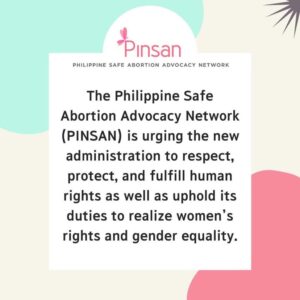01 Jul Women’s and human rights’ groups urge the new administration to uphold its obligation to advance women’s rights and gender equality
A day after the Presidential inauguration, the Philippine Safe Abortion Advocacy Network (PINSAN) is urging the new administration to respect, protect, and fulfill human rights as well as uphold its duties to realize women’s rights and gender equality. Integral to the fulfilment of women’s rights and gender equality is ensuring the accessibility and availability of comprehensive sexual and reproductive health services and information including safe abortion free from stigma, discrimination, coercion, and violence.
However, safe abortion often remains inaccessible and highly stigmatized in the country. As laws on abortion remain restrictive, they unnecessarily put women at risk, as women are left with fewer safe options and little to no access to proper medical facilities. Unsafe abortions result in thousands of preventable deaths annually. Restrictive abortion laws deprive women of their bodily autonomy and strip them of their fundamental right to access essential healthcare.
“Intrusion upon women’s personal decision to discontinue their pregnancies is meant to control and subjugate women. Women should be free to decide on their bodies, lives, health, well-being, and their future. This is basic to women’s right to equality and non-discrimination,” said Atty. Clara Rita Padilla, Spokesperson of PINSAN, and executive director of EnGendeRights..
In his February 2022 interview with Boy Abunda, President Ferdinand Marcos, Jr. recognized the negative public health impact of the restrictive abortion law. He cited statistics on hundreds of thousands of women forced to undergo unsafe abortions and the high number of women who die from abortion-related complications. Marcos Jr. believed that abortion should be allowed in cases of rape and incest and noted that “[abortion] is a woman’s decision because it is her body.”
In 2020, PINSAN launched a campaign that sought to decriminalize the country’s antiquated and restrictive law on abortion, in compliance with the international human rights obligations and women’s right to equality and non-discrimination.PINSAN urges this administration to heed the clamor to decriminalize abortion in recognition of the dire realities Filipino women face. We urge the President to champion women’s rights and reiterate his support for abortion rights. We call upon him to recognize the need to decriminalize abortion. as a rights-based solution to this longstanding public health issue where women are able to access safe abortion and post-abortion abortion without fear of government intrusion.
Atty. Clara Rita A. Padilla stated, “He made a pronouncement, and it’s up to him to make his pronouncement a reality.”
“We, at PINSAN, will continue to demand for the decriminalization of abortion as we believe that it is an essential step towards the realization of women’s rights and gender equality, bodily autonomy, and the achievement of reproductive justice.” Marevic Parcon, Executive Director of Women’s Global Network for Reproductive Rights and a Steering Committee member of PINSAN added.
Jihan Jacob, Senior Legal Adviser for Asia of the Center for Reproductive Rights and a Steering Committee member of PINSAN said, “[w]e know why there is a need to decriminalize abortion. We know why our current laws on abortion lead to unnecessary harm and preventable deaths and injuries. With his statement, the President seems to also understand the grave situation that abortion seekers face in the country. But would this understanding also translate into action? That is worth asking the President. If he is indeed committed to ensure that a woman can decide for her own body, what steps is he going to take to guarantee that?”
“To understand the unreasonableness and extensive impact of the restrictive abortion law, it’s not only women who induce abortion who are affected. As a result of the stigma, women suffering from naturally-occurring pregnancy complications such as spontaneous abortions or miscarriages, intrauterine fetal demise, and incomplete abortion are denied access to even legal therapeutic abortions and post-abortion care. This shows the gravity and urgency of our problem. It is high time that abortion is decriminalized in the Philippines. After all, it’s the woman who should decide about her body, no one else. We expect the Philippine government to address this urgently,” concluded Atty. Padilla.

